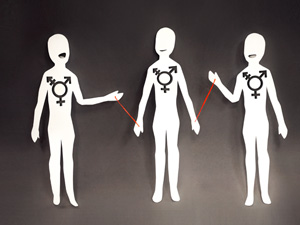
The Pride Center and the Klotz Health Center are currently exploring the possibility of having an endocrinologist on campus to help patients with transgender-related health concerns.
Students who are transgender or are questioning their gender will soon have the ability to speak with a trained counselor at University Counseling Services.
“We have not yet identified a consultant or made any arrangements for consultation, but we are seeking information from local physicians who work in this area about health care options for transgender students and are exploring the specialists’ availability and the cost of their services,” said Dr. Linda Reid Chassiakos, director of the Klotz Health Center.
No specific date has been set for this expansion.
Young adults in this position, especially first time freshmen, have the opportunity to explore exclusive resources available to them on campus that they may not have had in high school or at home.
The Pride Center has assisted the Klotz Health Center in training staff members on how to approach and communicate with trans-identified students.
With the Pride Center’s help, the health center’s staff has become more knowledgeable in related areas such as preferred gender pronouns, as well as providing the type of compassion and respect needed in relation to students’ health concerns and requests for transitional-related care.
Transitional-related care includes providing referrals to specialists who assist with transgender hormone therapy. The health center can also administer hormone injections for trans students who are under the care and prescription of an endocrinologist.
University Counseling Services provides resources as well as individual and group therapy for all students. There are weekly support groups organized for students who identify as lesbian, gay, bisexual, transgender or queer.
“During the past year, UCS has increased its attention on how we might best reach transgender or gender non-conforming students,” said Konjit Page, a doctor with University Counseling Services. “We’re interested in not only reaching out to inform students about our services, but to understand where there might be areas in which we could improve some of our services.”
T-Time, a newly formed discussion group for transgender and gender-questioning students is being organized by Page and the Pride Center.
“The group will provide space for students to discuss and explore issues related to gender identity and expression,” Page said.
Based on other feedback from CSUN’s transgender community, the Pride Center is working with Information Technology and Admissions and Records to allow the submission of a personally chosen name as well as a mandatory legal name when registering for school.
This feedback, provided by Pride Peer Mentor, Cadence Valentine, said that this would mean students would be able to use their chosen name for systems such as Moodle and Solar while their legal name would only be needed for student records.
“When speaking of the necessity of recognizing the specific needs of those on campus whom are transgender or gender questioning, it is imperative to remember that being secure in one’s identity, whether it be in the classroom, electronic records, physical and mental health services and in every facet of a student’s life, is far more than a matter of convenience and consideration,” Valentine said. “It is a matter of personal safety.”
UC schools have already implemented trans-inclusive health coverage in their student health insurance policies. To members of CSUN’s trans community, it is not a matter of cost but more an acknowledgment to a growing population in need of recognized health coverage.
The CSU system has yet to employ this type of coverage in their available health insurance plans.
“We also recognize that receiving medical services related to gender transitions is typically not covered by health insurance, a barrier to access to these services for those uninsured or underinsured, and hope we can develop some affordable options for students seeking transgender services either at the (Klotz) or coordinated by the (Klotz) as a medical home,” Chassiakos said.
In December, the American Psychological Association (APA) board of trustees agreed to remove the term Gender Identity Disorder (GID) from their publication, Diagnostic and Statistical Manual of Mental Disorders.
Valentine said this term has been historically used to diagnose trans individuals and has had much negative feedback from the community.
“We must define ourselves not by how we allocate resources to the majority, but how we devise and enact measures to bring equality to the minority, especially when most of that minority still lives behind masks for fear of being a pariah,” Valentine said.






